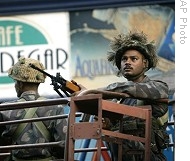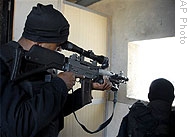voa标准英语2008年-Indian Forces Continue Battling Militants in Mu(在线收听)
 |
| Army personnel outside one of the famous eateries in Colaba, near the Taj Mahal Hotel, in Mumbai, 27 Nov 2008 |
India's financial capital saw commerce paralyzed and the city turned into a virtual war zone after police were outgunned by insurgents who held the city hostage.
The state's chief minister acknowledged that control had been ceded to the military and National Security Guards, a federal counter-terrorism group under the Home Ministry.
Commandos stormed luxury hotels where terrorists had taken guests hostage. Air force helicopters flew overhead along the shoreline. Navy and Coast Guard vessels pursued a ship, identified as the MV Alpha, suspected of possibly bringing in the terrorists from Pakistan.
As night fell, 20 hours after the initial attacks, elite troops conducted a room-to-room search inside the Taj Mahal Palace and Towers, as well as the nearby Oberoi-Trident Hotel, for hostages and terrorists. The soldiers were joined by firefighters who battled intermittent blazes at both hotels.
Army Major General R.K. Hooda, the commanding officer of Maharashtra state, cautioned reporters not to speculate on how long it would take for troops to end the siege by the heavily-armed gunmen.
"Our effort is to ensure that we bring back all people who are inside safe and also capture or eliminate the terrorists violence," he said.
 |
| Indian commandos take positions close to where Jewish families have been taken hostage in Mumbai, 27 Nov 2008 |
Special rangers of an anti-hijacking squad, who were flown into Mumbai, surrounded Nariman House, a residential and office building serving as the headquarters of an ultra-Orthodox Jewish outreach group. The rangers joined other special troops to try to free Israelis taken hostage by several gunmen.
A previously unknown group, Deccan Mujahideen, has claimed responsibility for the assault on Mumbai. One of the militants phoned an Indian television channel and expressed outrage over the deaths of Muslims in the disputed Kashmir region at the hands of the army.
News commentators here praised officials for dispatching elite units of Indian soldiers, sailors and airmen to battle terrorists in an urban environment.
 |
| Indian Army soldiers arrive in Mumbai, 27 Nov 2008 |
Police were criticized for a slow initial response to the Wednesday night shootings and grenade blasts. At one restaurant, popular with artisans and foreign travelers, which was sprayed with automatic gunfire, victims said police did not respond for 20 minutes.
Several of Mumbai's top law enforcement officers are being hailed as "martyrs" for giving their lives while chasing gunmen, some of whom hijacked a police vehicle and opened fire on bystanders.
The attack is the worst in India since explosions on suburban Mumbai commuter trains in July 2006 which killed 187 people and injured 800 others. But this strike is far different than the wave of bombings, blamed on Muslim extremists or, occasionally ultra-right wing Hindus, which have mainly targeted working class markets. This attack focused on locations frequented by the elite and the gunmen made a deliberate effort to take hostage foreigners, especially Americans, Britons and Israelis. Among the reported dead, besides Indians, are nationals of Australia, Britain, Germany, Italy and Japan.